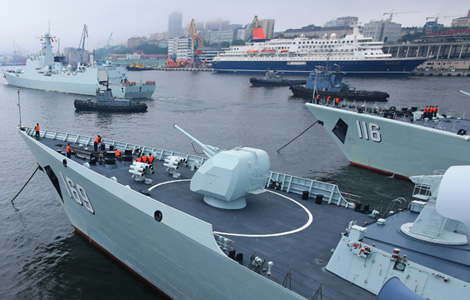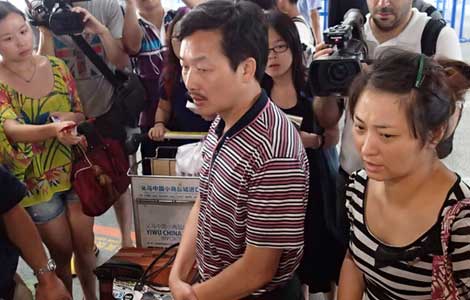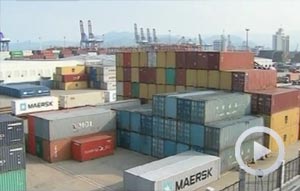Efforts help channel funds into real economy
Updated: 2013-07-07 14:33
(Xinhua)
|
||||||||
HANGZHOU -- The Chinese government's ongoing efforts to increase the velocity of money will help channel capital into the real economy and spur growth, experts attending the 5th China International Assets Management Conference have said.
Gregory L. Morris, chairman of the Investment Committee for Stadion Money Management, said at the forum that the velocity of the money supply is a much more important element to measure than the actual money supply itself.
The velocity of money refers to how many times money has changed hands in generating new money. A high velocity of money is usually considered good, as that means money put into the system is used over and over again.
Bi Jiyao, head of the International Economics Institute under China's National Development and Reform Commission (NDRC), said enhancing the velocity will increase financial support to the real economy and boost China's economic growth.
On Friday, the China Banking Regulatory Commission (CBRC) announced ten measures to increase the velocity of money, targeting foreign exchange reserves, private capital and bank loans, among others.
China's total social financing surged 50.2 percent to 9.11 trillion yuan ($1.483 trillion) during the first five months, prompting concerns about an excessive money supply and financial risks. The government has recently reiterated that it will stick to a prudent monetary policy while trying to improve efficiency in the use of funds.
According to the CBRC's new measures, China will use more funds from foreign exchange reserves as credit loans to firms and support these companies' moves to go global.
Tan Yaling, head of the China Forex Investment Research Institute, said the move will help increase the velocity of money in the forex reserves.
However, Tan said she expects to see more detailed measures from the government.
She said she wants to know if the companies receiving loans can use them for research and development activities that usually take place within China. "It would be a more innovative way of using the money and it would sharpen Chinese export-driven companies' competitiveness."
Bi Jiyao hailed the CBRC's efforts to invite private capital into the financial sector.
"China's capital-thirsty small and medium companies will find it easier to access loans once private capital sets up financial institutions," said Bi.
In this way, illegal fund-raising activities will also be curbed and the country's financial risks will actually be reduced, said Bi.
Morris said the CBRC's move to securitize quality bank loans will bring more liquidity into the Chinese market, but he warned of risks involved in mortgage-backed loans, citing the subprime crisis in the United States.
The CBRC has not specified whether it includes property loans in the asset securitization program.
All the experts maintained that more detailed measures should be mapped out as soon as possible.
China is pursuing a prudent monetary policy amid its efforts to strike a balance between stabilizing economic growth and guarding against financial risks.
Tan said the Chinese economy is likely to grow at around 7 percent this year, given the weak momentum seen in the first half and the government's efforts to push ahead with structural reforms.
However, Bi, who is affiliated to the NDRC, China's top economic planner, said the Chinese economy will mark growth of over 7.5 percent this year, meeting the government target.
"Following the recent volatility in the interbank market, there have been talks that the Chinese government has become unprecedentedly tolerant with a slower economy. I do not agree with that," said Bi.
"The government has the ability and resources to meet the growth target and it will," said Bi.
Bi said the Chines government is intentionally pushing ahead with the reform, and the data in the first half was not that bad.
If the weak momentum continues, the government can launch some measures to propel the economy a little bit, and then China can meet the growth target without difficulty, said Bi.
The 5th China International Assets Management Conference opened in Hangzhou, capital of East China's Zhejiang Province, on Saturday, drawing more than 600 experts and business delegates from the finance circle.

 Mourn for students in San Francisco air crash
Mourn for students in San Francisco air crash
 Rolling stone finally settles
Rolling stone finally settles
 Quebec disaster death toll jumps to 13
Quebec disaster death toll jumps to 13
 Double-decker bus caught fire in Shanghai
Double-decker bus caught fire in Shanghai
 China, Russia begin live-fire navy drill
China, Russia begin live-fire navy drill
 Grape expectations for Xinjiang county
Grape expectations for Xinjiang county
 Air crash victims' parents leave for US
Air crash victims' parents leave for US
 Victim's family mourn loss
Victim's family mourn loss
Most Viewed
Editor's Picks

|

|

|

|

|

|
Today's Top News
Air crash victims' parents leave for US
Terror law called for after attack
More Chinese firms investing in US
Subsidies aid poor families
Ex-rail chief sentenced
13 dead in Quebec train disaster
Premier Li lauds Guangxi's potential
Zhuhai's draft to establish new models
US Weekly

|

|






